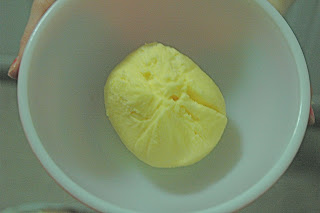
I expected this week to be difficult, because it is the last week of the first semester of my graduate program: papers were due, exams were taken, loose ends were tied up before the holidays, and I have been running around trying to get everything done, trying to be a model student.
I still have moments of doubt about this whole enterprise of getting a Ph.D. in clinical psychology. Doubt in myself, about what it means to have had a serious mental illness, and to place myself in the situation of wanting to help other people in distress. The thought dogs me: Am I well enough?, followed by: Am I good enough for this? Will I be able to do all that is required of me?
The way that I have dealt with my insecurities this semester has been to apply myself whole-heartedly to my studies, as if by knowing enough about statistics, IQ tests, neuroscience and the Diagnostic and Statistical Manual, I would somehow proove to myself and others that I was worthy of being in a Ph.D. program. The voice in my head presented a clear rationale: Even if they found out about my eating disorder, no one can say that I am a bad scientist. I have been objective to a fault: clear-headed, perspicacious, and critically-minded in my classes, my research job, and my encounters with faculty.
What I didn't know was that I was coming across as arrogant.
My faculty adviser and my research supervisor broke the news to me earlier this week, in two of the hardest conversations that I have ever had. I was so worried about doing something wrong in school, about failing to be brilliant or thoughtful or punctilious enough, but now it turns out that I was barking up the wrong tree altogether. I am a first year graduate student. There is no need to take so much responsibility on myself. I just need to study moderately hard, plan a second-year thesis, and do whatever my supervisor tells me to do at the research site. No need for intellectual pyrotechnics, no need to take on additional activities to impress my superiors, no need to rush ahead when I am fine just where I am.
My adviser reminded me, in breaking this news to me, that there are two main reasons why people come across as arrogant: either they are insecure, or they are very smart.
While I would like to believe that mine is the latter case, I know that I feel insecure about being in my Ph.D. program, but for reasons that he would probably never imagine.
I fear that I will never be able to help other people unless I am completely healed.
I fear that I will fail to help a patient because I have missed some critical piece of research or treatment technique that might be appropriate for them.
I fear that I will commit some act of negligency, like the psychiatrist whose inattention led to my father's hospitalization last winter.
I fear that I will let down my patients as I have been let down by doctors and therapists in the past.
So many fears! And yet it does me good to get them out on paper, and to own them as my own. I don't think of myself as arrogant, but as afraid and anxious. And, even before the eating disorder, my way to allay my anxieties has always been to learn more, as if knowledge itself was protection against my own fallibility, my own humanity. I believe that intellectual achievement would act as a talisman against all of the boogey men and long-legged beasties that lurk in corners. I made sure that, whatever else happened in my life, my academic accomplishments were seal-tight, and so I have been safe for a while. Just as I wrote in a previous post, Whatever else happened, at least I was thin, I have been operating by the assumption that Whatever else happens, at least I am smart. At least I had that much, when so many other things seemed beyond me grasp.
Chuan and I are about to go to China for two weeks, and I will have time to think about all of this there. There couldn't be a better time for me to step outside of my regular patterns and let the rhythm of travel carry me forward.









